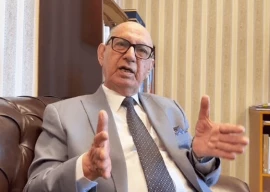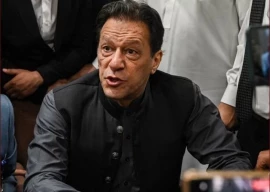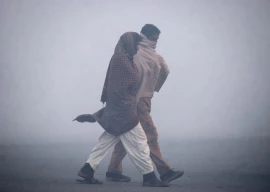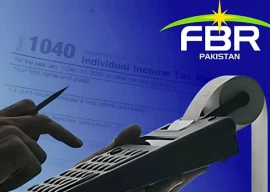IT engineer Asif Nawaz has found a novel way for the Election Commission of Pakistan (ECP) to ensure transparency in the voting process and do away with the burdensome task of voter lists verification: he has created a programmable Satellite Voting Device (SVD).
The device – which will cost between $3,500 and $5,000 – will not only put an end to ‘bogus’ voting, it will also help the government save on the huge expenses incurred on resources for the election process, says Nawaz.
The inventor is a graduate of the Al-Khair University, and the head of Business, Software House and IT Services of Business-20 – an Islamabad based private company. He has worked previously as a software engineer for Sanai Rugs Inc; an American company based out of Florida.
Nawaz says that the SVD is practical and flawless.
“Such machines are common in small offices and are used for ID verification of employees,” Nawaz says. “This is a highly intelligent machine,” he adds, “and the task it has to perform is not complicated – making it very practical.”
Explaining the functioning of the SVD, Nawaz says that voters will apply their thumb to the impression reader. “You have already cast your vote” will appear on the screen in case the person has already voted. This is the safety mechanism that makes fake or bogus voting impossible. If the voter has not yet casted their vote, they will receive a message that says “take me to ballot”.
After pressing the ‘take me to ballot’ button on the screen, a new screen – displaying symbols of all political parties – will appear. From here the voter can choose to vote for any party by touching their symbol. Choosing a symbol will magnify it in a new screen, which will also display a message reading “cast my vote”. Finally, pressing the ‘cast my vote’ button will complete the process.
All the SVDs will be linked with NADRA’s database. Upon casting the vote, the voting entry will be locked in the main database in a micro-second, and the same voter will not be able to vote again from any voting device.
Nawaz says that the implementation of this system will help the government in many ways. The device, according to him, is a one-time investment and will save a lot of money spent otherwise on printing ballot papers, preparing voters lists, counting votes, arranging for security and verifying voters list for fake votes.
There will also be no need for additional systems for overseas Pakistanis, he says. These portable devices can also be used for ID verification in important government and private buildings across the country – making them multipurpose machines.
“Considering all costs, it is much cheaper than the existing voting system,” he says.
Another advantage is that voters don’t need to carry their CNICs to the polling station. The device is portable and can also be programmed in multiple languages for the ease of rural voters. With the SVD, the Election Commission can split the voting process and spread it over more days.
Talking about the security of the system, Nawaz explains that the SVD is based on the Linux operating system, which is more secure. Secondly, these devices will be connected to the main database through intranet rather than the internet. The network will therefore be isolated and immune from any outside interference.
“Being an IT person, I can guarantee that this system is flawless,” Nawaz says.
Responding to a question, Nawaz says he has written several emails to the ECP. However, the ECP has not contacted him yet.
Nawaz says he is in talks with Apple, Dell and some other companies and all of them are willing to manufacture the device. However, the project can’t materialise unless approved by the government.
“Getting it manufactured by some company in China can be another option,” he says.
Nawaz, however, refuses to share the details of his correspondence with these companies, saying that these are confidential.
If the government approves and implements this system, it should take about 9 to 12 months to get it manufactured, according to the inventor.
Nawaz says he is also working on developing solutions for other government systems. “My target is to create and present practical and flawless alternates for all of our national systems,” he says.
Published in The Express Tribune, February 27th, 2012.
COMMENTS (18)
Comments are moderated and generally will be posted if they are on-topic and not abusive.
For more information, please see our Comments FAQ

1726117332-0/Megan-Thee-Stallion-(1)1726117332-0-165x106.webp)





















I like the verification part of the process......make sure that same person can not vote twice BUT the vote should be paper ballot, it is so easy to manipulate software nowadays.....one keystroke can change a win to a loss, a rigging of paper ballots takes a lot of effort :)
Although not very perfect, but a nice development which sould be appreciated.
However my concern is that this device will record the vote each individual gave, and so people with authority may easily track the people who are supporters of a certain party. This information can be misused, perhaps by threatning people if they vote for a certain party. people will also be reluctant to vote, if they know that their vote is being recorded along with their identity. Is there any solution for that?
My Two Cents: The printing of 'chosen election symbol' might not be the best idea, as it may lead to pressurizing the voter post voting. This mechanism can serve to be a really good voting system, without being pressured by the waderas and jagirdars. Instead of printing the chosen election symbol, a better approach would be to print a barcode which is a hash of the voter's NIC + the candidate ID, and probably encrypted using a private key. This way there will be an evidence, which can only be used by the ECP.
End of the day, I don't see this being implemented in next 20 years. We love to run behind the technology.
This system is a combination of VD+STD=SVD
(Electronic Voting + Paper Ballots) combination is the best idea
@amm: You are right. A combination of Physical and electronic voting can be the best idea. Because Zardari is sitting in the centre so no one can be stupid to believe that central database is difficult to manipulate.
Did Nawaz contacted PTI? He should contact PTI seniors in this regard
Well, this is not something new. Some countries have already adopted it. In Germany, Supreme court cancelled Electronic voting as there is no physical record of votes. I think only electronic system would make the task easier for those who manipulate elections at higher level. Such a machine should print a paper on which thumb expression and chosen election symbol is printed. So the physical evidence is also there along with electronic results.
"Being an IT person, I can guarantee that this system is flawless" My comment: Being an IT person, I can guarantee that this no system is flawless. Although I agree that its much more reliable than current methods.
@Ammad Malik: The biggest mistake made by all corrupt Mafia, illegal practices made in history of Pakistan is the creation of NADRA. I love NADRA it is and will be base for every future positive development in economy, where NADRA primary Data base will be only authentic for all. current example. FBR tax data, banks key verification, mobile companies and many may be more.
I hope such system would be implemented but i highly doubt it based on politics invovled in our EC. But if it does, then i would highly support Falcon recommendations for illiterate voters.
Secondly, I would suggest. As you mentioned that it will run on "intranet" for security purpose, Use an encryption key to secure the database/storage of that intranet. The public/private key pair should be generated by EC. The key for encryption could be entered in the system when it starts by Election Commission Officer at the duty on the very polling booth. It would definitely save lots of security threats.
If possible, the display of the screen should be more visual than description for illiterate voters.
Talk to NADRA first. Could help save you time.
Very impressive, such brillance should be appreciated. and all who not believe in it should know that it is the only sloution for country like pakistan where 180 M people can live identical and this is the future of Pakistan, no one can run from this, if cuurently this idea is not being picked in future it will be and who reject it now will be ashamed what they have done to serve this country.
good initiative but actual data of voter lists were fake according to Supreme court... will the result of this machine be credible...??
Flawless? You've got to be kidding me! While I do appreciate this initiative; Any IT guy will tell you how easy it is to manipulate the results directly in the database - If you have influence in ECP... and once you do; how exactly would you challenge the results?
Great innovation. Please keep up the good work. My humble two cents (based on experience of a similar project in New York): 1. If possible, the device should use simplest possible clues to accommodate illiterate voters as well (specially for transitioning between screens) 2. Address the possibility of abuse during data polling delays (since at that point, nothing else in the system except the original polling device would know about a person's vote and the same person can try to vote from another polling device within the narrow window, which would be eventually caught at the central database but de-duplication will be required). 3. Conduct a thorough infrastructure investment to ensure that device architecture will be supported by the kind of near real-time interaction you are interested in.